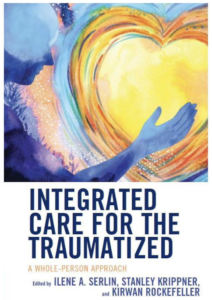Edited by Ilene Serlin, Stanley Krippner, and Kirwan Rockefeller
Rowman & Litttlefield Publishing Group, Lanham, MD. 2019
Review by David Bullard, PhD, SEP, and Sara Al-Zureikat, MD, MPH
This book truly lives up to its title, with chapters showing the wide range of helpful and healing individual and group practices that emerge from a whole-person (W-P) framework, rather than from a targeted, reductionist approach to human experience and trauma.
Top clinicians and researchers in the field of trauma, the editors have provided us with hope and inspiration for creative processes of healing. Fourteen additional chapter contributors make this a Who’s Who of trauma researchers and clinicians. To quote from the book’s foreword by another of traumatology’s top experts, Charles R. Figley, PhD: “The whole-person approach within an integrative care context is an important innovation that should be taught to anyone who works with, or may work with, the traumatized, starting with reading this book.”
This book has four sections: “Foundations,” “Whole-Person Group Therapy Models,” “Interventions for Communities,” and “Future of Integrative Care for the Traumatized.” Each chapter has descriptions of integrative models, research evidence, and current applications.
The editors begin by introducing the foundations of the whole-person integration of biological/psychological/spiritual/social aspects of trauma, together with the research paradigms that are most useful.
The second section begins with an integrative healing model from the Association of Trauma Outreach and Prevention, a “mind-body-ecospirit” method that has been used in over 45 countries. This model invites participants to discover and express the meaningfulness and positive reflections of their experiences.
Other stimulating and hopeful chapters include “Expressive Art for Helping Children Heal in Crisis and Disaster,” aimed at three psychological constructs: resilience, empowerment, and connection to others.
The chapter on “Dance Movement Therapy for Social Change” presents an integrated model that supports the participants in acknowledging their uniqueness and boosts their self-confidence. Participants dance together, share rhythms and movements in a unified healing process. Being mirrored by the group helps them to be seen and heard, expressing their needs and trusting in themselves more.
“Animal-Assisted Interventions with Those Who Are Traumatized” offers help to improve a person’s social, emotional, and cognitive functioning, describing interventions that are often successful where conventional methods fail.
“The Therapeutic Spiral Model” honors each participant’s experience as unique and worthy of exploration. In this clinically modified psychodrama approach, the traumatized person enacts the role of his or her story fully in all its aspects. It was found that these shared role-plays helped participants connect with the deepest parts of themselves and with each other.
In the chapter on “Time-Focused Psychotherapy,” it is recognized that each person has a distinct time-perspective. Focusing on the lessons learned during our journey in life helps us to live more in the present time, actively making time for what matters from family, friends, and interests, and all-in-all leads to a life based on stillness and presence.
The third section encompasses programs from Israel, indigenous or “first psychology” practices that have survived over millennia, and working with communities that have sustained pervasive and catastrophic communal trauma.
The final section includes a chapter on methods to enhance caregiver satisfaction and “regeneration,” originally developed by Israel Crisis Management SELAH (Hebrew: “a rock to lean upon”), and a concluding chapter by the editors pointing to future directions and recommendations.
This will be a guide and reference worldwide for trauma clinicians and researchers, students, and those affected by trauma for years to come. “It is an essential resource,” according to Alicia Lieberman, director, UCSF Child Trauma Research Program, Zuckerberg San Francisco General Hospital, California USA.
David Bullard, PhD, SEP, is a clinical professor in the Departments of Medicine and Psychiatry and Behavioral Sciences, Weill Institute for Neurosciences at the University of California, San Francisco, and has had a private clinical practice in trauma therapy and couples therapy for over 40 years.
Sara Al-Zureikat, MD, MPH (epidemiology), started volunteer work with Syrian refugees in Jordan in 2011 and has completed research on PTSD among Syrian women refugees. She has worked with various NGOs and is currently a health officer with MEDAIR, working on a community health program for Syrian refugees and underprivileged Jordanians.
Click here to read more about the product, or purchase…

